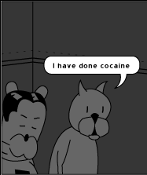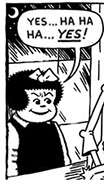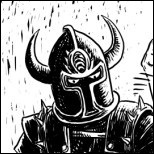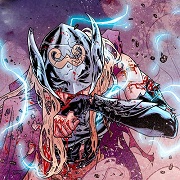|
gradenko_2000 posted:Crawford had this to say in the comments for the Scarlet Heroes KS: Yeah, and 3. it only has a 50% chance of dealing a single point of damage. I'll definitely consider it, I'm now kind of torn between whether I want to model his horned shield as an extra fray die or an additional die he can add to his regular attack. The game was a blast, by the way. We created his character (a Dwarf, because Dwarfs kick rear end), talked shop about the setting and then I ran a very quick dungeon-crawl where he basically bashed some goblins' faces in. Some highlights about the setting:
I'm actually going to prep this setting using An Echo, Resounding based on our ideas and then use that to add background events to the campaign as the game goes on. I'm very excited about this.
|
|
|
|

|
| # ? Jun 1, 2024 04:18 |
|
The 1e core books are now POD over on DriveThru for $25 a pop.
|
|
|
|
Evil Mastermind posted:The 1e core books are now POD over on DriveThru for $25 a pop. Shame that site has horrible shipping, so you'll be paying more like 45 bucks each if you want the book to arrive in less than a month
|
|
|
|
Evil Mastermind posted:The 1e core books are now POD over on DriveThru for $25 a pop.
|
|
|
|
Is there a retroclone that: * is in a standard D&D fantasy setting * uses ascending AC/target20 * has a built-in skill check/task resolution system (even a rudimentary one, such as d20-roll-under, as opposed to old-school D&D not mentioning it at all) As an example of what I'm trying to get at: * Stars Without Number uses target20 and has a skill system, but is sci-fi * Swords and Wizardry has support for using ascending AC, but has no skill system * B/X D&D has a skill system insofar as the roll-under "there's always a chance" paragraph, but uses an attack matrix * Scarlet Heroes/Exemplars & Eidolons/Godbound comes close, but the whole solo hero/divine hero thing could get in the way The closest I've gotten is maybe Basic Fantasy, since it uses ascending AC and has an optional rule for skill checks, but I wanted to ask if there was something else that I was missing (probably obviously)
|
|
|
|
FRINGE posted:You can get the core books for almost nothing used (unless that suddenly changed). I would also add the that the original 1st ed cores are as sturdy as tanks, and you only start to get lovely spines and such with the Orange spine books.
|
|
|
|
gradenko_2000 posted:Is there a retroclone that: Dungeon Crawl Classics uses ascending AC and has a pretty simple skill system based on target DCs with the die rolled based on character background - so a PC who used to be a blacksmith rolls a d20 to forge something, while the ex-gongfarmer rolls a d10. Some abilities and circumstances modify. Thieves get more skills as a class feature, using the 1E names for the most part, but they use the same mechanic. Whether you consider DCC a standard setting is another question. I think Darker Dungeons used ascending AC and had the RC/BECMI skill system, while Swords and Wizardry has ascending AC as an option but no skills, I think. It wouldn't be too hard to graft something on though.
|
|
|
|
Castles and Crusades uses a system called SIEGE where the Target Number changes if you are proficient in the related Ability Score or not. (I think DC 12 for prof. 18 for not, been a bit). D20+Ability Mod. Also Troll Lord announced they are skipping GenCon this year for other cons which will be weird. I enjoyed playing in Davis's big ole games every year. 
|
|
|
|
gradenko_2000 posted:Is there a retroclone that: The Nightmares Underneath fits everything except the standard setting. However, it would be pretty trivial to change the setting I think. Edit: Leaving aside my distaste for the publishers, I think ACKS and Lamentations of the Flame Princess also answer your description. thefakenews fucked around with this message at 08:25 on Jan 25, 2017 |
|
|
|
So I got a big box with a bunch of heavy metal cover art looking poo poo drawn on it in the mail yesterday. I guess I back to the DCC kickstarter and it somehow managed to totally forget about it. My desire to get back into RPGs is pretty much dead at this point as my schedule will never allow it, so I guess I'm wondering is this stuff worth anything, and if so what's the best site to try to sell it on?
|
|
|
|
gradenko_2000 posted:Is there a retroclone that:
|
|
|
|
finally got my DCC box. holy poo poo they did a TON of work. totally worth the wait. wish I weren't starting a S&W barrowmaze campaign 
|
|
|
|
Can someone sanity-check my train of thought: 1. Using the B/X D&D attack matrix, a level 1 Fighter (or all three classes from levels 1 to 3, technically) needs to roll a 10 or better to hit an AC 9 (unarmored) target. Assuming no bonuses (high STR, Bless, magic weapon), rolling a 10 or better on a flat d20 has a 55% chance of occurring. For every 1 lower/better AC, the to-hit number goes up by 1, and consequently the hit chance goes down by 5%. AC 8 = 50% chance AC 7 = 45% chance and so on. 2. If you were to convert this model to ascending AC, you would simply turn AC 9 into AC 10. The level 1 Fighter needs to roll the target's AC or better to hit. That's still a 10 or better, and therefore still a 55% chance of occurring. For every 1 higher/better AC, the to-hit number (which is now equal to the AC) goes up by 1, and consequently the hit chance goes down by 5%. AC 11 (previously AC 8 under the descending system) = 50% chance AC 12 (previously AC 7 under the descending system) = 45% chance and so on 3. If you were to convert this model to an opposed roll system, AC 9 unarmored (or AC 10 unarmored under ascending) would be a flat d20. For every 1 better AC, the "defense roll" gets a +1 to the d20 AC 8 would roll a d20+1 AC 7 would roll a d20+2 and so on With a level 1 Fighter rolling a flat d20 to attack, and the AC 9 unarmored target rolling a flat d20 to defend, the Fighter would have a 52.50% chance of rolling equal or higher than the target. AC 8 would be a flat d20 versus a d20+1, which would have a 47.50% chance of hitting AC 7 would be a flat d20 versus a d20+2, which would have a 42.75% chance of hitting and so on Is that all right?
|
|
|
|
Yeah, that seems right. The 52,5% chance to hit an unarmored enemy using the opposed roll method threw me off at first, but I checked it with AnyDice and you've got it right exactly. As an aside, I've always felt that opposed roll systems for combat don't really add much to the game except for the illusion that you're actively doing something to defend, even though the math ends up being largely the same. You can always introduce combat options like fighting defensively or aggressively where you take a -2 to attack for a corresponding bonus to defense or vice versa, but I've felt that since such options usually need to be declared on your own turn they actually work at odds with the immediacy of stuff like a defense roll. Were I to design a system with opposed roll combat I'd make it so that you declare combat options that improve your defense (like the aforementioned going on the defensive) before you rolled your defense but after seeing the enemy's attack roll, so you could actually react to a powerful attack by focusing on defense. However, the effects of going on the defensive/offensive would always carry on until the end of your next round and during that time you couldn't switch from the one to the other, meaning that if you'd decided to go on the offensive during your round you wouldn't be able to go on the defensive again when an enemy attacked you, and if you went on the defensive out of turn to react to an enemy's attack you wouldn't be able to go on the offensive come next round.
|
|
|
|
Thanks!Ratpick posted:As an aside, I've always felt that opposed roll systems for combat don't really add much to the game except for the illusion that you're actively doing something to defend, even though the math ends up being largely the same. The theoretical draw for me is that it's very apparent on both sides of the table what the result of the roll is. I throw a d20, the player rolls a d20. If theirs is higher than (or equal to) mine, they hit. Alternatively I suppose I could just write on a slip of paper what the thing's AC is and display it on the tabletop for all to see, but I was just thinking idly of how HackMaster 5e also does "defense rolls" and the gears just started turning.
|
|
|
|
gradenko_2000 posted:The theoretical draw for me is that it's very apparent on both sides of the table what the result of the roll is. I throw a d20, the player rolls a d20. If theirs is higher than (or equal to) mine, they hit. That's a good point, except for the fact that applying modifiers on both sides of the table obfuscates the actual result. However, an easy fix would be to simply apply the opponent's AC as a penalty to the attack roll. The math ends up being exactly the same, but only the attacking side needs to make calculations and once they've made their calculations they can simply compare their result to the face value on the "defense die" as it were. Speaking of Hackmaster 5e, it looks legit amazing and well-designed but I don't think I'd ever be able to actually play it with how involved it is. I only have the free Basic version and even that is intimidating.
|
|
|
|
Ratpick posted:As an aside, I've always felt that opposed roll systems for combat don't really add much to the game except for the illusion that you're actively doing something to defend, even though the math ends up being largely the same. You can always introduce combat options like fighting defensively or aggressively where you take a -2 to attack for a corresponding bonus to defense or vice versa, but I've felt that since such options usually need to be declared on your own turn they actually work at odds with the immediacy of stuff like a defense roll.
|
|
|
|
Ratpick posted:
Hackmaster 5e is pretty drat great if you like crunchy systems. But usually drat well had better have character creation down to a science befire you try and walk your players through it, else that's all you'll be doing for a session or two. Its really one of those systems that compresses well once you know it. First its clunky and everything takes a while and there's lots of stuff to juggle, but once you get comfortable everything just flies smoothly in a tenth of the time. The initial learning curve is nuts, though. The nice part is that the game is good at separating out necessary rules from optional rules that you can add onesy twosy as you play. It's a really well put together system.
|
|
|
|
As a technical writer, the thing that bothers me about tabletop RPGs is that most writers do not get that character creation should be a linear procedure. At no time should you need to flip back and forth to reference things that are out of order. The goal is to make it as easy as possible for a person to learn it--they need merely follow the steps. There are too many games that are actually quite simple that require players to spend hours learning what they are supposed to be doing. That's horrible.
|
|
|
|
dont even fink about it posted:As a technical writer, the thing that bothers me about tabletop RPGs is that most writers do not get that character creation should be a linear procedure. At no time should you need to flip back and forth to reference things that are out of order. The goal is to make it as easy as possible for a person to learn it--they need merely follow the steps. Are there any that you think do it well, especially regarding more complex systems?
|
|
|
|
dont even fink about it posted:As a technical writer, the thing that bothers me about tabletop RPGs is that most writers do not get that character creation should be a linear procedure. At no time should you need to flip back and forth to reference things that are out of order. The goal is to make it as easy as possible for a person to learn it--they need merely follow the steps. Depends how much customisation you want in your game, to be honest. Having said that, if creating a character is complex, then there should be a way for the GM to make it simpler for newer players. In GURPS, for example, one can create templates with reduced customisation options in order to speed things up. LeSquide posted:Are there any that you think do it well, especially regarding more complex systems? Beyond the Wall is excellent for this, though it isn't particularly complex. You roll on 7 tables, and then you have a character with a backstory.
|
|
|
|
LeSquide posted:Are there any that you think do it well, especially regarding more complex systems? Believe it or not, D&D is usually pretty good at it. Coincidentally, they have the most money and time to throw around. Books that actually use modernized design logic (and these are very rare) would be Marvel Heroic Roleplaying and 4E, off the top of my head. A lot of books get carried away with sidebars trying to sell you on the game's theory of functionality, bits of explaining things before it is necessary to explain them, and just chapters frankly being out of order. The ultimate example of doing it wrong would be Dark Heresy, which is a horrendous book and system on all counts and drove me to give up and write a Dungeon World hack for it.
|
|
|
|
Reading Marvel Heroic Roleplaying is the last time I remember a book's layout making me actually angry at it. Its flailing attempts to explain how its system works are dogshit that turned into an otyugh and hosed the dog that poo poo it out.
|
|
|
|
LeSquide posted:Are there any that you think do it well, especially regarding more complex systems? I think the PbtA playbook format is the biggest innovation in this in years.
|
|
|
|
Halloween Jack posted:Reading Marvel Heroic Roleplaying is the last time I remember a book's layout making me actually angry at it. Its flailing attempts to explain how its system works are dogshit that turned into an otyugh and hosed the dog that poo poo it out. I don't remember that being a problem. If anything the issue when I read it was that it was too deceptively simple - I kept checking the rules and going "that's gotta be a summary" and it was like "nope, those two sentences are seriously it."
|
|
|
|
Halloween Jack posted:Reading Marvel Heroic Roleplaying is the last time I remember a book's layout making me actually angry at it. Its flailing attempts to explain how its system works are dogshit that turned into an otyugh and hosed the dog that poo poo it out. Well, come to think of it, I roll that one back, since you cannot make a character in MHR. That's what I get for using the top of my head. However, the actual layout (as in how the book looks) is good. Being that I was talking about character creation as an SOP, however, I look like a horse's rear end.
|
|
|
|
dont even fink about it posted:Well, come to think of it, I roll that one back, since you cannot make a character in MHR. That's what I get for using the top of my head. However, the actual layout (as in how the book looks) is good. Being that I was talking about character creation as an SOP, however, I look like a horse's rear end. Huh? There's a character creation system in MHR - starts on OM110. It's a pretty good example of all this because it comes after the game has explained the rules and then everything on character sheets to you. People just don't USE MHR's character creation much/find it too mushy for them.
|
|
|
|
Arivia posted:Huh? There's a character creation system in MHR - starts on OM110. It's a pretty good example of all this because it comes after the game has explained the rules and then everything on character sheets to you. People just don't USE MHR's character creation much/find it too mushy for them. They don't use it because it's about a paragraph's worth of "Do whatever feels right" extended to several pages. quote:To create your hero the way you want, you need to know as much about him or her as you can. If youíre already a big fan of the character from the comics, thatís the best source. Maybe youíve read about someone in the Official Handbook of the Marvel Universe, or on the Characters archive at Marvel.com. These are all great resources. This is how to assign hero abilities. -Asking you to use outside resources, strike one... Or ignore them at your leisure! Whatever! -No balance system or consideration of balance whatsoever -Obvious predilection toward playing an established Marvel character It's remarkably shallow, to the point of being lazy. Notably, fans have done work on trying to establish a point system or really anything.
|
|
|
|
dont even fink about it posted:As a technical writer, the thing that bothers me about tabletop RPGs is that most writers do not get that character creation should be a linear procedure. At no time should you need to flip back and forth to reference things that are out of order. The goal is to make it as easy as possible for a person to learn it--they need merely follow the steps. One of my idle hobbies is to go through game systems and re-write the character generation process into something I'd be comfortable sharing with players on that great hypothetical day when I finally get to run it. Heck, I'm off to read through HackMaster Basic again!
|
|
|
|
dont even fink about it posted:Well, come to think of it, I roll that one back, since you cannot make a character in MHR. That's what I get for using the top of my head. However, the actual layout (as in how the book looks) is good. Being that I was talking about character creation as an SOP, however, I look like a horse's rear end. Only after plowing through this tedious poo poo do they explain what Assets, Complications, and Stress actually do. There is a term for this writing style. It's "Kevin Siembieda."
|
|
|
|
dont even fink about it posted:They don't use it because it's about a paragraph's worth of "Do whatever feels right" extended to several pages. To be fair, it's an uphill battle, really. How can you balance all of the Marvel superheroes? They were never meant to be balanced. Spiderman, the Incredible Hulk, Thor, Captain America, and Iron Man were once all on the same superteam. The writers usually b.s. balance in by just writing things a certain way so, considering the chargen system was intended to just be importing or updating heroes from the Marvel Universe, that's really as good as you can make it. The main hope being the internal Plot Point economy and the nature of the dice system to keep some semblance of balance.
|
|
|
|
Yeah, I find MHR is balanced just fine as long as you realize that the fights are going to look like comic books. Not everyone fights the big guy, some people save civilians or set up distractions or whatever. It's really good at being a comic book game, but that means it's not gamey in some ways we usually expect.
|
|
|
|
dont even fink about it posted:They don't use it because it's about a paragraph's worth of "Do whatever feels right" extended to several pages. There's not a point system or attempt to balance powers against one another because, once you play the game, you quickly realize that none of that actually matters and some player deciding to give himself straight D12's doesn't actually hurt anything.
|
|
|
|
Covok posted:To be fair, it's an uphill battle, really. How can you balance all of the Marvel superheroes? They were never meant to be balanced. Spiderman, the Incredible Hulk, Thor, Captain America, and Iron Man were once all on the same superteam. The writers usually b.s. balance in by just writing things a certain way so, considering the chargen system was intended to just be importing or updating heroes from the Marvel Universe, that's really as good as you can make it. The main hope being the internal Plot Point economy and the nature of the dice system to keep some semblance of balance. Several games have been released over the years that make the attempt to balance not just Marvel heroes but just about any hero (some of them end up awful, true). Also, for what it's worth, almost all the A-level Marvel heroes are cosmic or near-cosmic, if not in description then in deed. quote:Actually, my problem wasn't with character creation but with the first chapter that tries to explain how to play the game. Every time they explain a new trait on the datafile, they go into the vagaries of how you can add dice, step up dice, combine dice, keep extra dice, drill holes in dice, run a string through dice, feed dice up your butt. Then they do it again, like a dozen times. Let us forget I mentioned this game. At the moment I am actually struggling to come up with another game that does what I would like games to do. 3E certainly doesn't do it; prestige classes and magic items are hidden in the DMG for no real reason (perhaps other than to pad out the DMG).
|
|
|
|
dont even fink about it posted:At the moment I am actually struggling to come up with another game that does what I would like games to do. 3E certainly doesn't do it; prestige classes and magic items are hidden in the DMG for no real reason (perhaps other than to pad out the DMG). There is a reason, it's just a really bad one: older versions of D&D are built on the assumption that you don't know what kinds of loot exist and that finding it is a surprise (and potentially a nasty surprise) in the same way that really old editions are basically a oneupsmanship contest in who can make the most ridiculous Lurker variant. Same with prestige classes, the idea is that they're campaign-specific special options that the DM can nudge you towards and then reveal in the form of a hard-to-find mentor or something. Of course it doesn't work like this in practice among players who are actually well-informed about the game they're playing and D&D as a game doesn't really need or take advantage of hidden information in any interesting way 99% of the time, but I strongly suspect the reason wasn't gameplay-based to begin with; it's all about valuing the subjective experience of surprise. Tuxedo Catfish fucked around with this message at 22:27 on Feb 1, 2017 |
|
|
|
Also, they needed player-facing content to get players and not just DMs to buy the DMG
|
|
|
|
There is an argument to be made for players being able to purchase magic items even in old-school D&D in that gold is essentially worthless after a certain point simply because there's nothing to spend it on unless you choose to hoard it until you get to name level so you can build a sweet castle, but in my limited experience most campaigns rarely get to that point (and even if you do domain level play usually has very little support by the way of rules, meaning that even once you get to name level you still want to adventure because that's where all the cool content is). Gold basically just acts as the means of tracking experience and that's it. The Angry GM wrote about this topic a while back and while he mostly touched on the most recent edition, I think his points apply for older editions as well: http://theangrygm.com/nothing-here-but-worthless-gold/ Even with nonmagical equipment which you can actually spend your hard-earned cash on there isn't enough diversity in price range and mechanical benefits. Usually after the first couple of adventures you can already afford to purchase the best nonmagical armor available and get the weapon with the biggest damage die available to your class, and if you're a Magic-User none of that is important to you. I recently experienced this in my own campaign: even though in older sets plate mail was something you aspired to, something you could only afford after your first couple of adventures, in Rules Cyclopedia they messed with armor prices, so plate is only 40 gp. The only set that's better than plate is suit armor, which has the best AC but also comes with its own drawbacks (you can't surprise enemies 'cause they always know you're coming, if you get knocked down you only have a 1 out of 6 chance of getting up without help, etc.), so what this meant was that pretty much all the characters in my group were equipped with plate mail at level 1 and there was nothing beyond magical armors and shields for them to look forward to in terms of increasing defence. Improving your character's abilities through equipment should be fun, but it's rendered meaningless when most characters can afford the one kind of armor and weapon they'll be using for the rest of their career during the first few levels of the game. Having said that, making magic items simply available on the market really cheapens them: I talk a lot about Zelda these days because those games loving rock, and one part of that is that every dungeon has at least one item which you can't buy in a shop and which always changes the game on some fundamental level. D&D has a huge list of really good magic items which could evoke that same sense of wonder and fundamentally change the way players approach exploration, but they have to share space on the loot tables with +1 weapons and armor, which are boring but absolutely necessary to progress in the game after a certain point (you can't fight gargoyles without magic weapons, if the Fighter doesn't have a flaming weapon they're pretty much useless against trolls unless they enjoy flailing around ineffectively with a torch or throwing molotov cocktails, etc.). I want to throw well-placed magical items at the players which immediately allow them to approach situations in new and exciting ways, but at the same time I need to keep in mind that they also need those +1 weapons and armors to make any progress in the game, which frankly sucks. I know GP=XP is one of those sacred cows of old-school D&D that is enshrined in our minds as part of the old-school experience, but the more I think about it and how worthless gold is the more I feel that it has to go short of actually introducing a meaningful equipment list which actually allows for progression on the side through upgrading your equipment by spending gold. Hell, maybe the simplest solution would be to allow for buying magical weapons and armor on the market to allow for that progresson, and then making the really weird and fun magic items the focus of the loot you find in dungeons. What I know for a fact is that I'm ditching XP tracking altogether from my solo B/X game I'm running for an online friend and just giving him levels whenever it feels like it'd make sense. Also going to do my utmost to give him loot that actually matters instead of just boring old plusses.
|
|
|
|
Covok posted:To be fair, it's an uphill battle, really. How can you balance all of the Marvel superheroes? They were never meant to be balanced. Spiderman, the Incredible Hulk, Thor, Captain America, and Iron Man were once all on the same superteam. The writers usually b.s. balance in by just writing things a certain way so, considering the chargen system was intended to just be importing or updating heroes from the Marvel Universe, that's really as good as you can make it. The main hope being the internal Plot Point economy and the nature of the dice system to keep some semblance of balance. it's not that hard you just do it. when the hulk is on a team with spider-man he does spider-man level poo poo
|
|
|
|
I like random loot and rolling for it when designing the encounter. It's fun to come up with the story of why this goblin had a cool treasure, and it keeps things interesting. Items that just give flat mechanical bonuses are pretty lame in general. I like the +2 against <type of monster> idea much better because that limitation adds a lot of flavor.
|
|
|
|

|
| # ? Jun 1, 2024 04:18 |
|
Ratpick posted:I know GP=XP is one of those sacred cows of old-school D&D that is enshrined in our minds as part of the old-school experience, but the more I think about it and how worthless gold is the more I feel that it has to go short of actually introducing a meaningful equipment list which actually allows for progression on the side through upgrading your equipment by spending gold. Hell, maybe the simplest solution would be to allow for buying magical weapons and armor on the market to allow for that progresson, and then making the really weird and fun magic items the focus of the loot you find in dungeons. Something that came to mind while I was reading your post which might not be a fully-formed idea is the concept of purchasable magic items as a hole-filler for gear. Think of it from the perspective of an MMO: boss dies, he drops a random assortment of loot. That's extremely traditional RPG gameplay. You roll your d20s around a table, get to the end of the dungeon, and the DM gives you loot based on them rolling on a bunch of tables. The problem of this model in MMOs is that you need a certain quality of gear before you can move on to the next challenge, but you cannot guarantee that level of quality by the time you're tired of the content and want to move on. It's all probabilistic. You might still be missing your "set piece helm" after the 100th boss kill. Same also applies to TRPGs. If you need a +2 sword to hit the monsters spawned in the next overland hex's dungeon, but you didn't get a +2 sword yet, you're stuck. 3e and 4e "solved" this problem by wishlisting: the amount of wealth and its rate of acquisition is strictly controlled, and you can "force" a "drop" by simply buying it once you have enough gold to do so. And you know when you're supposed to have enough gold to do so. This is especially important in the context of how we generally don't expect "grinding" in a TRPG. But MMOs didn't do it that way. Instead, they used "tokens". Kill a boss, it drops loot AND you get a token. Get enough tokens, and you can buy some stuff. That stuff isn't going to be as good as some of the stuff you can still get from a boss drop, but it gives you a guaranteed floor of gear quality after so many kills, so that you can eventually be free of the current content and can move on even if you were the unluckiest bastard on Earth and never got anything off of the random rolls. So ... I guess what I'm saying is that even in a game where you're randomly rolling for loot, you should still have magic equipment buyable for gold. Perhaps it's not going to be 3e-style "everything is available (if you can find a rich enough city)", but at least a situation where the player will never be lacking in the bare necessities. The tricky part is going to be the pricing.
|
|
|



























